#RMBooks
Explore tagged Tumblr posts
Text
"A civilization which leaves so large a number of its participants unsatisfied and drives them into revolt neither has nor deserves the prospect of a lasting existence."
Sigmund Freud, The Future of An Illusion (1927)
#365booksfornamjoon#rmbooks#literature#sigmund freud#freud#capitalism#educate yourself against power
15 notes
·
View notes
Photo

What Namjoon reading right now: Andrew Solomon - The Noonday Demon: An Atlas of Depression
80 notes
·
View notes
Photo
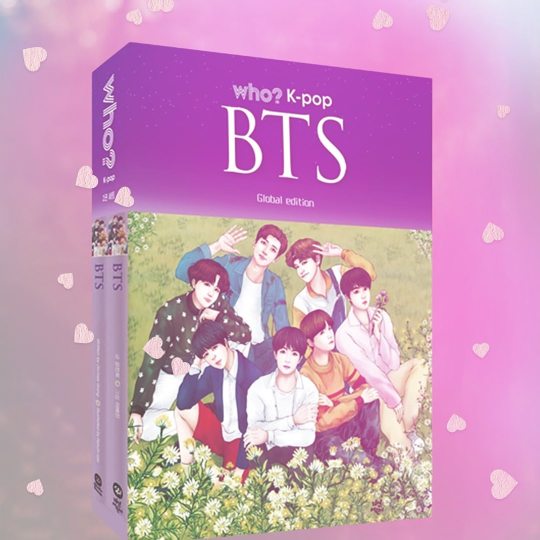
[🤩New Item🤩] Who? #Kpop #BTS Global Book Set (Korean Version + English Version) This book shows the story of Seven boys who had the same dream of becoming a 'singer' in different places. This is the cartoon and there are both English and Korean versions 😆 Tap the image or visit korea-box.com (link in bio) ⠀ ⭐️All Things For Korea⭐️ 🌼5% discount code: orderkb🌼 ⠀ ⠀ #bts #btsmerch #btsbook #jin #jhope #rm #jungkook #hobi #namjoon #v#taetae #parkjimin #bt21shop #rmbook #korea #korea #kpopbook #learnkoreanwithbts #learnkorean #learnkoreanlanguage #suga #yoongi #bt21merch #koreabox https://www.instagram.com/p/CSilRGTJSOG/?utm_medium=tumblr
#kpop#bts#btsmerch#btsbook#jin#jhope#rm#jungkook#hobi#namjoon#v#taetae#parkjimin#bt21shop#rmbook#korea#kpopbook#learnkoreanwithbts#learnkorean#learnkoreanlanguage#suga#yoongi#bt21merch#koreabox
0 notes
Photo

The Catcher in the Rye - J.D. Salinger #rmbooks #love #currentlyreading
0 notes
Video
youtube
Well... it is another Friday, another day to love, to Oxum, Oshun, Freya, or Venus, another day to Kizomba! Phillyp and Sharon chose a very beautiful place to dance in the begining to this collage. The only thing I wish was that the couple could dance they way they walked midway in the video. Getting couples to dance relaxed, like they are when they are walking together gently is the hardest part. At 2:30 you can stop watching. https://www.youtube.com/watch?v=9Ts9jPNayj4 #YOUTUBE #AALBC #KOBO #RMBook #RMEbooks
5 notes
·
View notes
Text
0 notes
Link
Check out my post! I'm really trying to do something productive so support me please.
0 notes
Text
"Love doesn't exist. There is only a world that works, that goes, that comes, that wins money, that uses a clock, that strains the minutes and the cents and just ends up rotten in a hole, with a stone above that leads to the name of unhappiness"
Elena Garro (Mexico, 1916-1998)
#365booksfornamjoon#rmbooks#literature#quote of the day#elena garro#mexican literature#quote about love#quote about life#capitalism#educate yourself against power
8 notes
·
View notes
Text
The literary sources of BTS’ “Singularity” (Part II)
Chapter II: Oedipus Rex, the blind who had eyes
* This is a personal and purely philological analysis, that is, centred on the study of literature and/or the language as used in literature.
* This post was originally written in Spanish and translated into English, sorry if there are any errors.
* You can check part I --Narcissus and the problem of self-identity--, here.
* Also, you can check my in-depth analysis of Singularity lyrics here.
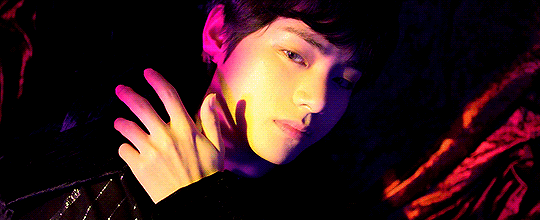
As we established in the first part of the analysis, one of the main literary sources of "Singularity" is the classic myth of Narcissus, established in Western culture through the Metamorphosis by Ovid. Remember that Narcissus, the son of a nymph and a god, ends up so enamoured with his reflection that he ends up falling into the water where his beautiful face appears, dying because of his own vanity. We affirmed that in one of the versions of the myth, the mother of Narcissus, the nymph Liriope, decides to visit Tiresias (in ancient Greek, Τειρεσίας), one of the most famous soothsayers of Greek mythology. This character, present as a prophet in all Greek tragedies related to the founding of the city of Thebes --one of the most important social nuclei of ancient Greece-- is not only considered the mediator between gods and humans but between men and women --by its androgynous nature. and between life and death.
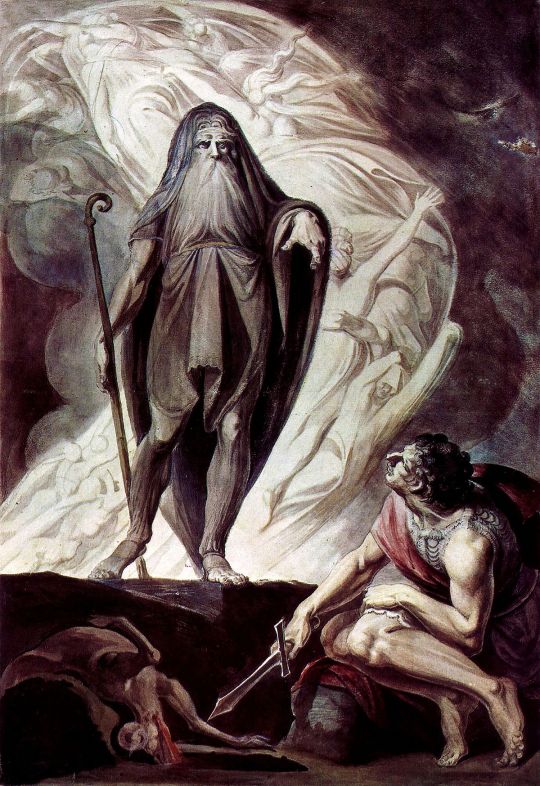
[Tiresias appears in front of Odysseus during the sacrifice, Heinrich F��ssli (1780-85)]
One of the main tragedies, and the one that will centre this second part, is Oedipus Rex (Oι̉δίπoυς τύραννoς), a Greek tragedy written by Sophocles in an unknown date (it is believed that it was composed around 430 BC). Broadly speaking, the work begins during the mandate of Oedipus, king of Thebes and husband of Jocasta. His glorious reign is dying by an aggressive epidemic of plague and he orders his brother-in-law Creon to depart for the Oracle of Delphi (a sacred temple dedicated to Apollo, built in the Villa of Delphi, Greece).
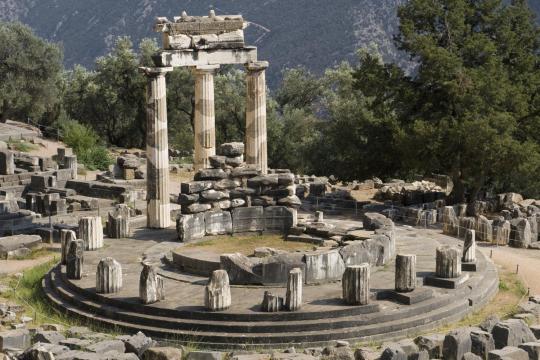
The prediction is clear: the plague is a divine punishment because the death of Laius, the previous king, has not been avenged and it will not disappear until the guilty party is killed or sent into exile. After this, Oedipus collaborates arduously to discover the culprit -- to who promises to save his life and only punish him/her with exile--, relying on his citizens and the close members of his family. It is precisely Creon who introduces the character of Tiresias since he advises the monarch to come to him to solve the problem.
OEDIPUS: Teiresias, you who understand all things—what can be taught and what cannot be spoken of, what goes on in heaven and here on the earth—you know, although you cannot see, how sick our state is. And so we find in you alone, great seer, our shield and saviour.
We must bear in mind that Tiresias, who appears in this work as a character already known from other mythological cycles --Greek tragedies were represented in the amphitheatres and used to use dynasties of characters that all the public knew-- is a blind fortune-teller. When he arrives in Thebes, he refuses to declare what he knows, even though he was present at the time of Laius' murder, and he and Oedipus confront each other in a heated conversation. Irritated, Tiresias declares that Oedipus is the murderer that Oedipus himself is searching for and insinuates him that he lives in incest with his mother, with whom he has had children, he is not the Theban as he believes and that, shortly, he will be blind like him. Faced with such accusations, Oedipus does not believe him and thinks that the fortune-teller has conspired with Creon to snatch his throne.
TEIRESIAS: I say that with your dearest family, unknown to you, you are living in disgrace. You have no idea how bad things are.
OEDIPUS: Do you really think you can just speak out, say things like this, and still remain unpunished?
TEIRESIAS: Yes, I can, if the truth has any strength.
OEDIPUS: It does, but not for you. Truth is not in you— for your ears, your mind, your eyes are blind!
TEIRESIAS: You are a wretched fool to use harsh words which all men soon enough will use to curse you.
TEIRESIAS: You may be king, but I have the right to answer you—and I control that right, for I am not your slave. I serve Apollo, and thus will never stand with Creon, signed up as his man. So I say this to you, since you have chosen to insult my blindness— you have your eyesight, and you do not see.
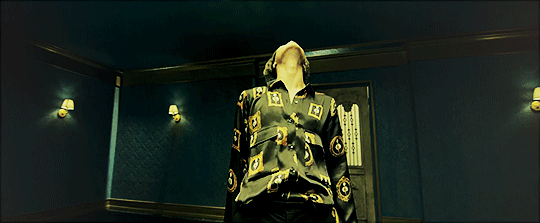
Since the tragedy is extensive, I will try to explain the argument briefly. Finally, Oedipus, who was actually the heir of the kings of Corinth, left his city because of an oracle that proclaimed that he would kill his father and marry his mother. He wanted to avoid the tragedy of his destiny and fled. During the way, he's entangled in a brawl in which he assassinates several people ..., one of them turns out to be Laius. With the intervention of several witnesses, it is known that Oedipus was not the biological son of the kings of Corinth since he had been abandoned on a mountain shortly after being born and saved by a messenger from the kingdom of Corinth. Little by little, Jocasta, his wife, realizes the truth: Oedipus is the son that she and Laius abandoned to their fate so that a fateful oracle would not be fulfilled, unaware that the messenger had managed to save him. Oedipus, oblivious to his true identity, had become a brave citizen of Thebes and, after overcoming the enigma of the Sphinx, took the throne. Married to his mother and having killed his real father, Oedipus stabs his eyes, not wanting to see the tragedy of his existence, and asks for an exile with his two daughters, which marks the end of the story.
OEDIPUS: But the hand which stabbed out my eyes was mine alone. In my wretched life, why should I have eyes when nothing I could see would bring me joy?
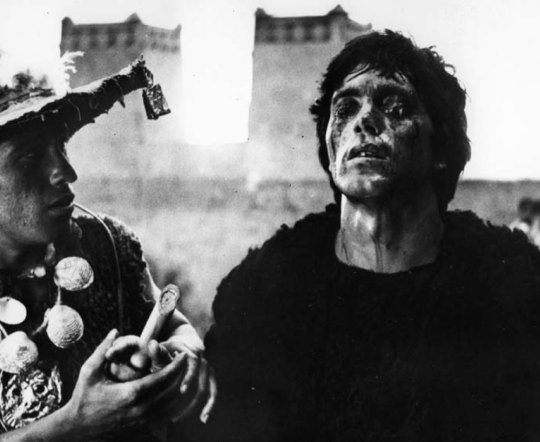
[Oedipus Rex, film adaptation by Pier Paolo Passolini (1967)]
In summary, we can see that Tiresias is the only one, by being ironically blind, who can see the truth in a world full of people who have eyes but cannot see. He's the famous prophet whose true revelation is not accepted when he twice proclaims it. The originality of Sophocles lies in this irony (especially taking into account that Tiresias appears at the beginning of the tragedy), in the belief that the knowledge of the human being is not a simple objective fact that is imposed on us, but a subjective possession before the one we can react belligerently, as a possession that partly needs to be possessed by the one who receives it to become effective. That is why Oedipus rebels against the truth, because he believes more in him than in the gods.
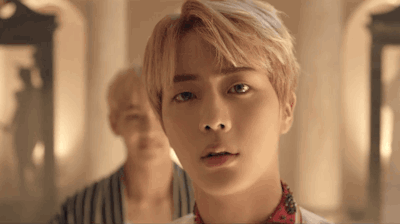
A fatal love, the intervention of a vengeful divinity or the problematization of sight are common themes between the myth of Narcissus, Oedipus Rex and Singularity. If we stop a bit in the lyrics, we can extract some examples:
A sound of something breaking I awake from sleep
We have the fracture, the rupture of the individual once he realizes he's wearing a mask, he's blind.
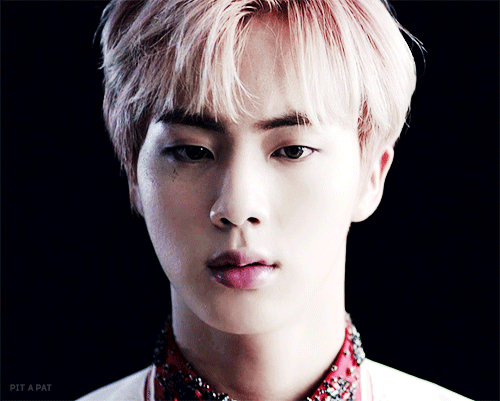
I dumped myself into the lake I buried my voice for you Over the winter lake I was thrown
The lake, an obvious reference to Narcissus and his death. On the other hand, the second verse talks about a certain culprit (that’s why he says 'for you’ or uses passive verbs that exempt him from responsibility: 'I was thrown’), like if he was even talking to a god, maybe to a woman (that's the simplest interpretation). However, he's talking to himself. He's the culprit of his blindness like Oedipus is.
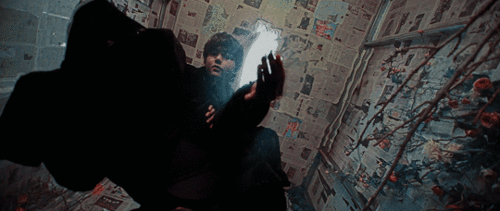
In addition, another interesting aspect is the last speech of the tragedy. This is said by the chorus, a collective character who comments and judges what happens in the tragedy and represents the Theban citizen, the public. I could not help thinking about the dancers of the video.
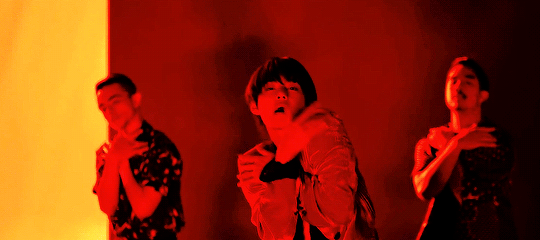
CHORUS: You residents of Thebes, our native land, look on this man, this Oedipus, the one who understood that celebrated riddle. He was the most powerful of men. All citizens who witnessed this man’s wealth were envious. Now what a surging tide of terrible disaster sweeps around him. So while we wait to see that final day, we cannot call a mortal being happy before he’s passed beyond life free from pain.
Also, BTS tends to distort the figure of the idol, that is, the famous singer who is seen as a deity and not as a human being. Oedipus, like Taehyung, is seen by the public as a king, as a divine emissary, but eventually ends up being as mundane as the spectators. He suffers, he has doubts and, sometimes, he doesn't love himself either.
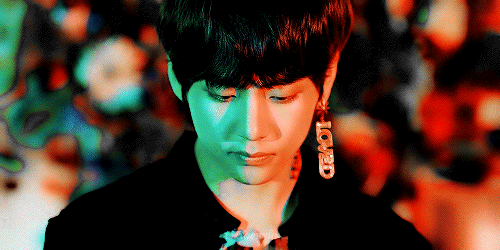
Lastly (I KNOW THAT I AM WRITING A LOT), among the main themes of this fabulous work of universal literature, we must talk about the problem of the search for truth and the risks and harms involved in achieving knowledge. Nietzsche speaks of this drama in the 9th chapter of the Birth of Tragedy (1871-1872). The main thesis of this book states that art is based on two fundamental notions that the Greeks of the archaic era and the classical era, ie, the Greeks prior to Socrates, knew: the two fundamental impulses of nature that are symbolized by two Greek gods, Dionysus and Apollo.
Apollo and Dionysus symbolize two physiological states of the human being: sleepiness and drunkenness; as well as two vital impulses: the individuation (JUNG'S INDIVIDUATION PROCESS!!!!!) and the overflow. Broadly speaking, Nietzsche makes use of the deities to highlight the human condition in its strictest sense and, in turn, unveil the struggle or opposition of forces that hide in the bosom of nature. Apollo symbolizes the veil (the beautiful forms/artistic creations that adorn life and justify it) and Dionysus symbolizes suffering, death, truth..., the tragic wisdom, that is, the terrible awareness of the finitude of Men and his suffering existence. Nietzsche states that the hypertrophy of some of the elements could be harmful to man, an excess of veil could lead to optimism and rationalism, and an excess of truth could lead to suicide or asceticism. Both elements are necessary so that life can be kept in balance.
To end, Nietzsche presents Oedipus as a transgressor, a hero condemned to fall for having tried to go too far. By transgressing nature and social norms, and wanting to find out what is forbidden, Oedipus discovers a world whose vision is forbidden to the rest of mortals. He commits a masculine, heroic version of original sin by choosing to eat from the tree of knowledge that condemns humanity to abandon innocence. In this case, it is his curiosity and his integrity that encourages him to investigate. That abandonment of innocence, of comfortable ignorance, is the cruel and heroic destiny of Oedipus, and his deed consists in his sacrifice (LIKE IT HAPPENS IN 'DEMIAN'!!!). Searching in ourselves, inquiring into our motives and wounds, has a price, it leads to a rupture of the individual necessary for the rebirth of the being.
Thus the man who is responsive to artistic stimuli reacts to the reality of dreams as does the philosopher to the reality of existence; he observes closely, and he enjoys his observation: for it is out of these images that he interprets life, out of these processes that he trains himself for life. It is not only pleasant and agreeable images that he experiences with such universal understanding: the serious, the gloomy, the sad and the profound, the sudden restraints, the mockeries of chance, fearful expectations, in short the whole 'divine comedy' of life, the Inferno included, passes before him, not only as a shadow-play — for he too lives and suffers through these scenes — and yet also not without that fleeting sense of illusion; and perhaps many, like myself, can remember calling out to themselves in encouragement, amid the perils and terrors of the dream, and with success: 'It is a dream! I want to dream on!' Just as I have often been told of people who have been able to continue one and the same dream over three and more successive nights: facts which clearly show that our innermost being, our common foundation, experiences dreams with profound pleasure and joyful necessity (Nietzsche, The Birth of the Tragedy).
I hope you liked this and found it interesting and easy to read. I’m working in the next chapters, which will talk, among many things, about these works/characters/topics:
Frankenstein (Mary Shelley, 1818): A man can create his own monster
Wuthering Heights (Emily Brönte, 1847): Narcissus and Heathcliff
Jane Eyre (Charlotte Brönte, 1847): Understanding the Double - Jane Eyre and Bertha Mason
Alice Through the Looking-Glass (Lewis Carroll, 1871): The mirror symbolism
Strange Case of Dr. Jekyll and Mr. Hyde (Robert Louis Stevenson, 1886): Evil in a reflected identity
The Picture of Dorian Gray (Oscar Wilde, 1890): Self-image and ego
Dracula (Bram Stocker, 1897): Innate evil without a reflection
Peter Pan (James Matthew Barrie, 1904): Seeking for a reflection in the absence of shadows
Ophelia (from Hamlet, by William Shakespeare, 1603): Madness, water and suicide
From the myth to contemporaneity: how to codify identity and body in the information age
#365booksfornamjoon#rmbooks#rm books#namjoon reading#namjoon books#namjoon reading list#kim daily#bts theory#bts analysis#bts lyrics#singularity#singularity explained#bts singularity#oedipus rex#sophocles
36 notes
·
View notes
Text
Day 76
Hermann Hesse (1877-1962) - Wandering, Notes and Sketches (1920)
"To be at home with myself! How different life would be! There would be a center, and out of that center all forces would reach. But there is no center in my life; my life hovers between many poles and counterpoles. A longing for home here, a longing for wandering there. A longing for solitude and cloister here, and an urge for love and community there.
Many detours I will still follow, many fulfillments will still disillusion me. One day, everything will reveal its meaning. There, where contradictions die, is Nirvana. Within me, they still burn brightly, beloved stars of longing."
#365booksfornamjoon#rmbooks#literature#kim namjoon#kimdaily#namjoon reading list#quote of the day#love yourself#self esteem#self love#philosophy#german philosophy#hermann hesse
17 notes
·
View notes
Text
The Tables Turned - William Wordsworth (1798)
Up! up! my Friend, and quit your books;
Or surely you'll grow double:
Up! up! my Friend, and clear your looks;
Why all this toil and trouble?
The sun above the mountain's head,
A freshening lustre mellow
Through all the long green fields has spread,
His first sweet evening yellow.
Books! 'tis a dull and endless strife:
Come, hear the woodland linnet,
How sweet his music! on my life,
There's more of wisdom in it.
And hark! how blithe the throstle sings!
He, too, is no mean preacher:
Come forth into the light of things,
Let Nature be your teacher.
She has a world of ready wealth,
Our minds and hearts to bless—
Spontaneous wisdom breathed by health,
Truth breathed by cheerfulness.
One impulse from a vernal wood
May teach you more of man,
Of moral evil and of good,
Than all the sages can.
Sweet is the lore which Nature brings;
Our meddling intellect
Mis-shapes the beauteous forms of things:—
We murder to dissect.
Enough of Science and of Art;
Close up those barren leaves;
Come forth, and bring with you a heart
That watches and receives.
#365booksfornamjoon#rmbooks#literature#poetry#poem#romanticism#romantic poem#romantic poetry#english poetry#william wordsworth#nature
10 notes
·
View notes
Text

Annette Messager (Berck, France, 1943): "I am my own Prophet" (2017).
As a result, gender is not to culture as sex is to nature; gender is also the discursive/cultural means by which "sexed nature" or "a natural sex" is produced and established as "prediscursive", prior to culture, a politically neutral surface on which culture acts.
• Judith Butler (1956-) - Gender Trouble: Feminism and the Subversion of Identity (1990)
#365booksfornamjoon#rmbooks#literature#feminist literature#feminist writers#feminist writing#feminist#feminism#femininity#queerart#queer theory#judith butler#gender#sexuality#gender trouble#art#annette messager
10 notes
·
View notes
Text
BTS’ lyrics as Nietzsche’s aphorisms (Part II)
· You can check part I in here ·
Of all the literary influences that characterize, directly or indirectly, the discography of BTS, Nietzsche – like Schopenhauer and C.G. Jung–, are continuously present in what we could call Bangtan’s world philosophy. The imaginary that surrounds their compositions, of high symbolic and conceptual complexity, establishes relations with the works of universal literature and manages to connect and approach, uniting the educated discourse with the mainstream discourse, an audience of all kinds. For instance, one of those works is Beyond Good and Evil, written by Friederich Nietzsche in 1886. In the aphorisms included in this book (Chapter IV, entitled Maxims and Interludes) we can see to what extent the lyrics of BTS drink from the philosophy of this author, considered one of the most important thinkers of the nineteenth century.
79 · A soul which knows that it is loved but which does not love itself reveals its bottom layers - its deepest stuff comes up.
It’s my fate. Don’t smile to me, lie to me, because I can’t get closer to you, there’s no name you can call me. You know that I can’t: show you me, give you me; I can’t show you a ruined part of myself, once again I put a mask on and go to see you, but I still want you (The Truth Untold).
80 · A matter which is explained ceases to concern us. - What does that god mean who advised "Know thyself"? Does that not perhaps mean "Stop being concerned about yourself! Become objective!" - And Socrates? - And the "scientific man"?-
Who says a dream must be something grand, just become anybody. We deserve a life, whatever big or small, you are you after all (Paradise).
81 · It is dreadful to die of thirst in the sea. Must you then salt your truth so much that it can no longer - quench your thirst?
I just started walking and ended up at the sea. I’m looking at the coast from here, there’s endless sand and the rough wind, but I’m looking at a desert. I wanted to have the sea so I swallowed you up, but I’m even thirstier than before. Is what I know really the ocean? Or a blue desert? (Sea).
82 · "Pity for everyone" - that would be hard and tyrannical for you, my neighbour.
Follow the sound of the pipe, follow this song It’s a bit dangerous but I’m so sweet. I’m here to save you, I’m here to ruin you. You called me, see? I’m so sweet. Follow the sound of the pipe..., I’m takin’ over you (Pied Piper).
83 · Instinct - when the house is burning, people forget even their noonday meal. - Indeed, but people later haul it out of the ashes.
When you called me I became your flower. As if we were waiting, we bloom until we ache (Jimin, Serendipity).
88 · We begin to mistrust very clever people when they become embarrassed.
Gonna breathe a little slower, cuz my life and my rap, they’re usually too fast (RM, Forever Rain).
89 · Dreadful experiences lead one to wonder whether the person who undergoes them is not something dreadful.
On the other side of the famous idol rapper stands my weak self, it’s a bit dangerous. Depression, OCD, they keep coming back again from time to time. Hell no, perhaps that might be my true self, Damn, huh, feeling estranged in reality, the conflict with ideal, my head hurts (Suga, The Last).
90 · Heavy, melancholy men become lighter precisely through what makes other people heavy, through hate and love, and for a while come to their surface.
I collect myself that's shattered beneath the moonlight. I call you moonchild. We are the children of the moon. I breathe the cold night air: yes, we're livin' and dyin' at the same time (V & RM, 4 O’CLOCK).
91 · So cold, so icy that we burn our fingers on him! Every hand that grasps him pulls back! - And for that very reason some assume he's glowing hot.
Kiss me on the lip, lips. This is a secret between the two of us. I am addicted to the prison that is you, I cannot worship anyone else besides you, I knowingly drank from the poisoned chalice (Blood, Sweat & Tears).
92 · For the sake of his good reputation who has not once - sacrificed himself?
Even if I’m slow I will walk with my own feet, because I know this path is mine to take. Even if I go back, I will reach this path eventually. I never, I will never, I will never lose my dream (Lost).
94 · Maturity in a man: that means having found once again that seriousness which man had as a child, in play.
I don’t have biceps or pecs, I don’t have a super car like Batman, the ideal hero is my fantasy, but all I can give you is Anpan. I’ve dreamed of becoming a hero like Superman, I ran with all my strength, jumping high up in the sky. I’m not afraid of little things like bruising my knees, innocent fantasies of my childhood (Anpanman).
95 · For someone to be ashamed of his immorality: that is a step on the staircase at the end of which he is also ashamed of his morality.
I am still the same person I was before. I am here, the same person I was from before, but an overgrown lie is trying to swallow me whole (Jimin, Lie).
97 · What? A great man? I always see only the actor of his own ideal.
Rappers who act arrogant, my flow job that takes them all and toys around with them. If you try to damage me with simple words like that I only become stronger (Suga, J-Hope, RM & Supreme Boi, Cypher Part 3).
98 · If we train our conscience, it will kiss us at the very moment it bites us.
Yes I hate you, you left me, but I never stopped thinking about you, not even a day. Honestly, I miss you, but I’ll erase you, because it hurts less than to blame you. I try to exhale you in pain, like smoke, like white smoke. I say that I’ll erase you, but I can’t really let you go yet (Spring Day).
99 · The disappointed man speaks: - "I listened for the echo, and I heard only praise -"
Me, a shadow behind the stage. Me, in the depth of darkness. I didn’t want to show everything including my pain, but because I’m still unaccustomed I just wanted to make you smile, I wanted to do good, so thanks. Believing in someone like me, dealing with these tears and wounds, so thanks for becoming my light, for becoming the flower in the most beautiful moment in life (2!3! Still Wishing For More Good Days).
#365booksfornamjoon#rm books#kimdaily#rmbooks#bts theory#bts analysis#friedrich nietzsche#bts lyrics#beyond good and evil#aphorism#feel free to repost
22 notes
·
View notes
Text
Writer’s note: This is something that I wrote when I was in my second year at university. I had always been fascinated by the poetry of courtly love, medieval and pre-Renaissance, and I tried to compose a poem with the metrics of those pieces. This is a Spanish translation, so the rhythm is quite lost, that’s why I have also added the original version.
Under the apple tree, sitting down, I was of his flower the thorn.
Red, the hand picked it up, waiting for whom I most loved. In my door he affection required, but on the way, I ended up lost.
Mother, whom I most loved, inflicted under the shirt cruel wound. Hair per pendant, in black rose the dawn when this sweet maiden was surrendered.

(Drawing of a medieval manuscript, XIII century)
Bajo el manzano sentadita, era yo de su flor la espina.
Roja, la mano la recogía, esperando a quien yo más quería. En mi puerta amores requería, pero por el camino terminé perdida.
Madre, quien yo más quería, infligió bajo la camisa cruel herida. Cabellos por colgante, negro amanecía cuando esta dulce doncella fue rendida.

(’The Tomb’, by Frank Dicksee [1853-1928])
#365booksfornamjoon#rmbooks#literature#poetry#poem#courtly love#medieval#medieval literature#medieval poetry#romeo and juliet#amor cortés#romantic poetry#romantic poem#poesía#poesía en español#spilled ink#spilled words#spilled poetry
8 notes
·
View notes
Text
How many times did people use a pen or a paintbrush because they could not pull the trigger?
Virginia Woolf, Selected Essays
#365booksfornamjoon#rmbooks#literature#virginia woolf#selected essays#quote of the day#quote about literature#freedom
4 notes
·
View notes
Text
Jin’s ‘Awake’: A dialogued poem
It's not that I believe it,
this chimaera of mine that extinguishes,
but I want to try holding out
with these wax fingers that are consumed,
because this is,
these useless lungs that breathe poppies in a glass urn,
all that I can do.
I want to remain,
drowned in an hourglass.
I want to dream more,
pushed by a rebellious heart that will be immortal.
Even so, what I'm saying is
that the fire must annihilate my phoenix soul,
that it's time to leave;
I have to say goodbye to my flight across the sky.
Yeah, it's my truth.
My oath before the altar of my reflection.
It's my truth.
They cannot take it from me.
I will be covered with wounds all over,
but they cannot take away my freedom to dream.
But it's my fate,
to die again and again facing myself.
It's my fate.
They cannot snatch my vain search for the feather that survived the flames of resignation.
Still, I want to struggle and fight.
Fight until you believe that a new tomorrow will rise.
Maybe I, I can never fly.
I can't fly like the tender smile of the first kiss.
I can't fly like the flower petals over there.
Or though I have wings,
they are made of remote ashes.
Maybe I, I can't touch the sky.
Still, I'm not dead to settle into the clouds.
Still, I want to stretch my hand out.
I want to get drunk from the nectar of life.
I want to run, just a bit more,
until exhausting the paths of innocence.
I'm just walking and walking among this darkness
and the stars accompany those who have hope.
My happy times asked me this question:
You, are you really okay, it asked me
Oh no, I answered, dreamers are always lonely.
I replied, no, I'm so afraid,
This road is deserted and nobody has faith in me.
Still, I hold the flowers tightly in my hands.
Still, I don't give up because I'm alive.
I'm just walking, I said.
Oh no, it's painful.
But it's my fate.
I will continue forward even if I fall flat on my face.
It's my fate.
My promise that will shine like a perennial dawn.
Still, I want to struggle and fight.
Fight until you believe that a new tomorrow will rise.
Maybe I, I can never fly.
I can't fly like the autumn leaves that are reborn.
I can't fly like the flower petals over there.
Or though I have wings,
maybe they're a flutter of shadows.
Maybe I, I can't touch the sky.
Still, a purple mantle cures my scars.
Still, I want to stretch my hand out.
I want to be the captain of my verses.
I want to run, just a bit more,
to resuscitate in the insurmountable body of a child.
Wide awake, wide awake, wide awake.
Don't cry.
You will be safe.
No lie.
Music will never stop singing your victories.
Fly high over the sunset.
Choose not to surrender, bird of light.
HAPPY BIRTHDAY, JIN! I, we, love you 💜
#365booksfornamjoon#rmbooks#happy birthday jin#happy bday jin#jin's day#bts lyrics#awake#jin awake#my writing#poem#poetry#creative writing#feel free to reblog#keep on dreaming#HappyJinDay
10 notes
·
View notes